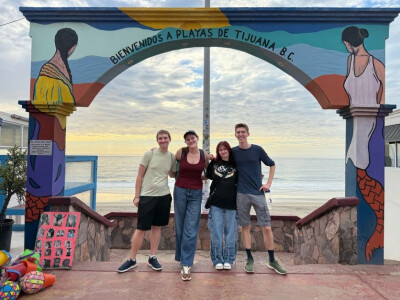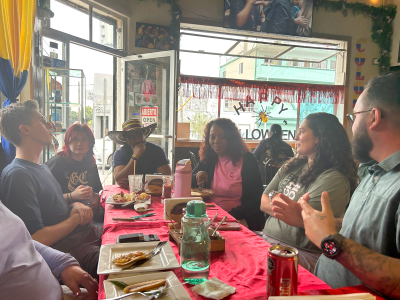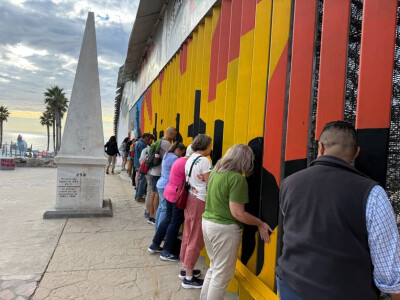Reflections from the Border: Insights from the San Diego–Tijuana Immersion 2025
A reflection by Greta Merrill
 From October 9 to 13, I had the opportunity to visit San Diego, California, and Tijuana, Mexico with the United Methodist Church and the Immigration Law and Justice Network. This trip included a lot of “firsts“ for me: my first time west of Pittsburgh, my first time touching the Pacific Ocean, my first time touching a palm tree, and my first time traveling to Mexico. It was also my first time truly exploring faith-based advocacy and discovering what that can look like in the context of immigration issues. I want to use this reflection as an opportunity to highlight some specific experiences and lessons from this trip that had the most significant impact on me.
From October 9 to 13, I had the opportunity to visit San Diego, California, and Tijuana, Mexico with the United Methodist Church and the Immigration Law and Justice Network. This trip included a lot of “firsts“ for me: my first time west of Pittsburgh, my first time touching the Pacific Ocean, my first time touching a palm tree, and my first time traveling to Mexico. It was also my first time truly exploring faith-based advocacy and discovering what that can look like in the context of immigration issues. I want to use this reflection as an opportunity to highlight some specific experiences and lessons from this trip that had the most significant impact on me.
Meeting Other Members of the Conference
I love the United Methodist community I grew up in and the United Methodist community that I’ve found at AU, but it was amazing to meet members of other conferences. Everyone brought different perspectives, and connecting over shared meals (including a three-hour lunch in Tijuana) helped me truly appreciate the welcoming nature of this faith community. As I continue to grow in my faith, this experience is something that I know I will carry close to my heart.
Stepping Beyond Immigration Narratives
 As a college student in D.C. studying international relations, many of my classes approach immigration from an analytical perspective. This trip was different. Yes, we learned a lot of facts, but we also heard personal perspectives from people who deal with the messy, complicated reality of immigration in our country every day. Pedro Rios, Attorney Hollie Webb, Rev. Dr. Joel, Rev. Navarrete, and each site visit opened my eyes to the highly constructed narratives around immigration that we so often hear in the interior, especially in Washington, D.C.
As a college student in D.C. studying international relations, many of my classes approach immigration from an analytical perspective. This trip was different. Yes, we learned a lot of facts, but we also heard personal perspectives from people who deal with the messy, complicated reality of immigration in our country every day. Pedro Rios, Attorney Hollie Webb, Rev. Dr. Joel, Rev. Navarrete, and each site visit opened my eyes to the highly constructed narratives around immigration that we so often hear in the interior, especially in Washington, D.C.
Walking across the border to Tijuana was a particularly surreal experience. We were less than 15 minutes from where we’d parked the rental cars, but it felt like everything was new. I looked toward the horizon and was surprised that I could still see San Diego.
Our first stop was Espacio Migrante, a family shelter in the city. The presentation room was bright and filled with artwork. A large mural covered the walls, and books were lined neatly on shelves. The shelter staff told us about their role in supporting families and how essential their work is when many government shelters are split by gender and are unsafe. Using in-ear translators, we listened as they described their community-centered mission.
Because the U.S. border remains closed, Espacio Migrante has had to undergo a significant pivot. In the past, the organization has helped support families whose ultimate goal was to reach the United States, often through the asylum process. Today, they are focusing on helping residents build a life in Tijuana, including translating resources into Haitian Creole for the city’s growing Haitian population. The dedication of the staff, the vibrant artwork, and the sense of community in that space left a deep impression on me.
Visiting the border wall on both the Mexican and American sides was also incredibly powerful. The physically imposing presence of the 30-foot steel is difficult to put into words.
Finding Your “Standing”
 Toward the end of the trip, the word standing kept coming to mind. In legal language, standing refers to the right to bring something before a court, but here it felt like something deeper. Because of this experience, I feel better prepared to speak up about immigration issues in my church, at my school, and in my workplace. I have more of an experience to stand on.
Toward the end of the trip, the word standing kept coming to mind. In legal language, standing refers to the right to bring something before a court, but here it felt like something deeper. Because of this experience, I feel better prepared to speak up about immigration issues in my church, at my school, and in my workplace. I have more of an experience to stand on.
When conversations around immigration slip into binary thinking (right/wrong, good/bad, legal/illegal), especially in academic or workplace environments, I find myself remembering what we saw in Tijuana. I think of the shelter staff, the murals, the bookshelves, and their commitment to community. I can say, “This is what I saw. This is what it was like.” When something comes from personal experience, it’s harder to refute, and sometimes keeping it simple, telling a story about real people doing real work, can help someone step beyond the binary.
I’m incredibly grateful to National United Methodist Church and Pastor Rachel for making this trip possible for me, to Carlos for his leadership, to Rev. Dr. Joel for his patience and welcoming arms, and to every single attendee on this trip who made it something I’ll never forget.
